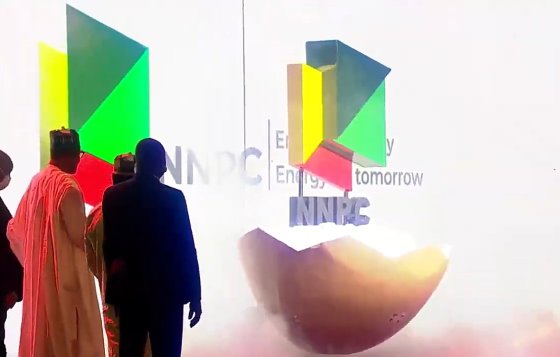Business
NNPC Grows Profit To N674bn, Assets Hit N16.3trn

The Group Chief Executive
Officer, Nigerian National Petroleum Company (NNPC) Limited, Mele Kyari, has announced that the NNPC as a corporation grew its profit after tax and assets from N287 billion and N15.86 trillion in 2020, to N674 billion and N16.3 trillion in 2021, respectively.
Kyari, who disclosed this at a press conference in Abuja, said the 2021 profit was contained in the Group Audited Financial Statement of the oil firm for the year ended December 31, 2021.
He also disclosed that all major trunk lines conveying crude oil to export terminals were currently shut down in order to avert further oil theft in the Niger Delta.
He, however, stated that efforts by the oil firm, security agencies and surveillance contractors were paying off, as about 400,000 barrels of crude would be added to the country’s output in the next few days.
The NNPC boss said, “In September 2021, Mr. President graciously approved the publication of the 2020 NNPC Group Audited Financial Statement, in which NNPC declared a profit after tax of N287bn for the first time in its 44 years.
“Despite our challenging operating environment, we strongly believe that NNPC has the potential to sustainably deliver better value to its esteemed shareholders.
“Today I am happy to announce that the Board of NNPC Limited has approved 2021 audited financial statements, and NNPC progressed to a new performance level, from N287 billion profit in 2020 to a N674 billion profit after tax in 2021, climbing higher by 134.8 per cent year-on-year profit growth.”
He continued ed, that “the group’s financial position recorded an increase in total assets from N15.86 trillion in 2020 to N16.27 million in 2021, while our total liabilities decreased by 8.3 per cent from N14.68 trillion in 2020 to N13.46 trillion in 2021.
“Our shareholders fund position grew to N2.81 trillion, representing 144 per cent year-on-year. The performance would have been greater if the operations in the year under review were free from incessant vandalism, crude oil and products’ theft among others.”
In the main drivers of the profit, Kyari said, “Our core business is upstream, gas and power. So the key drivers to this performance are coming from the upstream and the gas and power.”
Commenting on the amount of crude oil being lost to theft and why it had been difficult to contain oil theft, the NNPC helmsman stated that though oil production had slumped, not all reported volumes were stolen.
“Today, our production is around 1.2 million barrels per day. We have proven capacity and this was seen in 2020, where our production, without any intervention, peaked at 2.49 million barrels per day.
“That means we have capacity, without doing anything extra, to produce up to 2.49mbpd. But since COVID-19 abated and, of course, the issues around the acts of vandals returned, we saw this gradual decline in our production to the point of this 1.2mbpd production currently.
“That means that you can easily produce up to 2.49mbpd but you couldn’t do it because of the acts of vandals. Now, this doesn’t mean that the difference between 2.49mbpd and 1.2mbpd is stolen. No. It is far from this.
“As we speak now, all our major trunk lines are shut down. That means you are not flowing crude oil into these lines, but you could have done it and it doesn’t mean the product is stolen. When the lines are running, you can lose a substantial part of that volume.
“And we believe that when they are running, you can lose up to 200,000 barrels to theft. But in actual losses today, our budget level plan is to produce at 1.8mbpd. So, if you are doing 1.2mbpd, it technically means you are losing the difference between 1.2mbpd and 1.8mbpd.
“And this is around 600,000bpd as opportunity lost, not stolen. So, once you bring back the line and you are not able to secure it, you’ll still get some of the oil flowing into the terminals but you’ll lose some part of it”, he said.
Kyari insisted that the above scenario did not mean that 600,000bpd of oil was stolen, describing it as opportunity lost because of the shutdown of production facilities.
“But I’m happy to also say that the interventions that we have seen in terms of the security measures we have taken, in collaboration with the government security agencies, with the private surveillance and security contractors, and the investments that we have done, we believe that in the next couple of days we will be able to bring back the Trans Niger Pipeline,” he said.
###
Business
Fidelity Bank To Empower Women With Sustainable Entrepreneurship Skills, HAP2.0
Business
President Tinubu Approves Extension Ban On Raw Shea Nut Export
Business
Crisis Response: EU-project Delivers New Vet. Clinic To Katsina Govt.
-

 News2 days ago
News2 days agoAmend Constitution To Accommodate State Police, Tinubu Tells Senators
-

 Politics2 days ago
Politics2 days agoSenate Urges Tinubu To Sack CAC Boss
-

 News2 days ago
News2 days agoDisu Takes Over As New IGP …Declares Total War On Corruption, Impunity
-
Business2 days ago
President Tinubu Extends Raw Shea Nuts Export Ban To 2027
-
Business2 days ago
Crisis Response: EU-project Delivers New Vet. Clinic To Katsina Govt.
-
Business2 days ago
President Tinubu Approves Extension Ban On Raw Shea Nut Export
-
Rivers2 days ago
Etche Clan Urges Govt On Chieftaincy Recognition
-
Business2 days ago
Fidelity Bank To Empower Women With Sustainable Entrepreneurship Skills, HAP2.0

